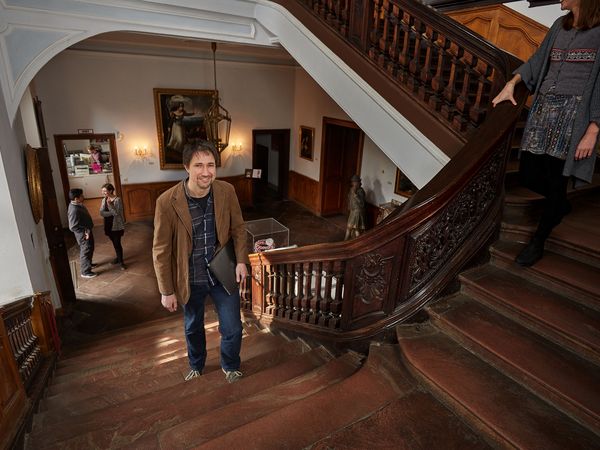CCB: You are a junior professor at the Institute for Media Culture and Theatre at the University of Cologne. Why do you play at the university?
Beil: We play at the university or discuss and research games in order to classify this complex medium in our everyday lives. What interactions are there with other media? Why are more and more people playing? It seems that there is a new playful culture. In this respect, we play at the university, but not as some people think.
You studied in Siegen and now hold a junior professorship in Cologne. What is your favourite place in Cologne?
I don't have a favourite place in Cologne, but I'm always discovering new places. Cologne is a green city. I really like the Flora with the Botanical Garden, which is rather atypical for Cologne.
Cologne has been able to call itself the digital capital since 2015. Does the digitalisation of a city play a role in your research?
It plays a role because computer games are, of course, very closely linked to this debate. I find it interesting that nobody really knows exactly what a digital city should be... The exciting thing, as with computer games, is that it's not about digitalising everything, but about finding solutions where digital offers support the classic ones. Computer games are not just about virtual worlds either, but also about non-virtual gaming cultures, about social communities that develop out of a shared interest in games.
Do you benefit from the fact that Cologne is further ahead in this respect than other cities?
I benefit in that the topic is increasingly coming into focus. That Cologne is also a small facet of the games location.
For example…
The keyword is gamification. This is about the application of playful structures in a non-playful context. Fitness wristbands, for example: I measure my sporting activity, the whole thing is translated into a database, points are awarded, a competitive context is created. So there are interfaces that lead to playful cultures.
The gamescom, the game developers conference Europe, the digital marketing exposition & conference take place in Cologne. Do you take part in them?
I take part in the gamescom congress. This is a platform connected to gamescom for academics but also for people from marketing and education, so it is very broad-based and intended as a platform for networking. The good thing about Cologne is that there is a huge range on offer. Many smaller and larger events are attached to gamescom alone. This works relatively smoothly in a location as large as Cologne because everything can be bundled by the large congresses.
Do you also work with the Cologne University of Applied Sciences (CUAS)?
We work together with the Cologne Game Lab (CGL), which is part of the CUAS, on various projects. We are responsible for the cultural studies side, while the CGL is more application-oriented, with a focus on game development, e.g. in an educational context. These different perspectives on computer games complement each other perfectly.
You chose the Theatre Studies Collection at the University of Cologne for the shoot. Why?
Because I find it very exciting: the Theatre Studies Collection at Wahn Castle is one of the largest of its kind in Europe. Among other things, it has a large collection of puppets. From there, it was only a small step to digital puppets, to digital game characters, so-called avatars. Computer games are often compared to films, but actually the medium that is closest to them is theatre: it's about performance, about playing a role... Our institute is called the Institute for Media Culture and Theatre. And the collection belongs to the institute. Old and new media: a wonderful source of friction!
